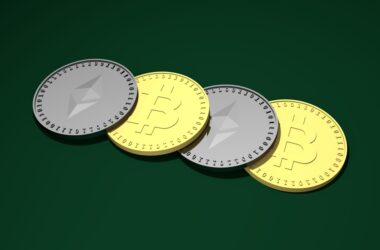The 50th anniversary of the Bretton Woods agreement has come and gone. The agreement, ratified in 1944, created an international currency exchange mechanism that lasted through the early 1970s. The agreement required the USD to have its value pegged to gold and the other signatories’ currencies pegged to the dollar.
As regulators in the United States try to disrupt the advance of Bitcoin, the fact is, Bitcoin is replacing gold.
Mike McGlone, senior market strategist of Bloomberg Intelligence, credits the digitization of finance as a driving factor behind the outstanding growth of Bitcoin vs. gold. McGlone noted that the same factors helped the U.S. dollar gain dominance quickly and organically over gold. Since 2011, spot gold prices have fallen more than 99 percent against Bitcoin.
These comments were voiced by McGlone during a recent three-day conference attended by economists, investors, and macro analysts. The conference, held at the Breton Woods hotel in New Hampshire, drew attendees from Fidelity Investment and Morgan Stanley, and others.
The hotel is well known amongst economists for being the host venue for the U.N Monetary and Financial Conference that eventually led to the world’s primary economies tying their domestic currencies to gold. The result was a new monetary establishment known as the “Bretton Woods System.”
The system lasted until mid-August, 1972 when then U.S. President Nixon removed the dollar from the gold standard. The decision was applauded by many economists, calling the gold standard nothing more than a “barbarous relic.”
The recent Bretton Woods conference focused on emerging financial assets, including Bitcoin, assets that are threatening to displace the U.S. currency, becoming the next reserve asset.
Fifty Years of Dollar Dominance
In an article written by economic historian Harold James of Princeton University, he suggested that digital technologies are the driving force behind a never before seen monetary revolution, one that could spell the end to the dollar’s global importance.
The article hinted at the role Bitcoin and other crypto assets could play in reshaping the economy as it is currently known. The statement appeared even though the dollar has survived imperfect conditions in the last 50 years and still emerged as the world’s reserve asset.
What has been dubbed “The Nixon Shock” in the early 1970s drove double-digit inflation in the United States. This inflation, in turn, caused the value of the American currency to fall over 50 percent against the Japanese and German currencies. However, neither the yen nor the DM could take the place of the U.S. dollar in the battle for fiat domination.
In the early 1980s, the U.S. currency posted a strong recovery. The dollar posted somewhat similar upside movement in the second half of the “90s, during the so-called “dot-com” boom and subsequent bust.
The dollar has managed to escape unscathed during the current COVID crisis as well as the 2008 financial crisis.
Is There Dollar Shock in the Future?
The question begs to be answered, “Why did the U.S. dollar survive?” A Bloomberg contributor offered three reasons.
- The dollar received support and backing from the high-interest rates set by the Fed.
- Liberalized capital markets fueled by a boom in euro and petrodollar markets ramped up the utility of the dollar in international markets.
- The United States maintained the power to sanction financial markets on those countries deemed unsupportive of American policies.
However, the dollar has met economic headwinds following the current COVID crisis. During the last year and a half, the United States deficit climbed to over 13 percent of GDP, the second-largest increase since the end of WW2.
The deficit is expected to grow even further on the heels of the $1 trillion infrastructure bill recently passed by the Senate. It has been estimated by the CBO, (Congressional Budget Office), that the current stimulus will expand the deficit by a further $250 billion-plus within the next ten years.
Bitcoin vs. Gold
The loose monetary policies being followed by the Fed has resulted in significant price rallies for Bitcoin. The exceptionably strong upside movement has beaten gold, the traditional asset use as a hedge.
Anthony Pompliano, a partner in Pomp Investments, has long been an advocate of Bitcoin. In a recent letter to clients, he notes that those holding their wealth in dollar, bonds, or gold will see negative rates of return.
WeInvests is a financial portal-based research agency. We do our utmost best to offer reliable and unbiased information about crypto, finance, trading and stocks. However, we do not offer financial advice and users should always carry out their own research.
Read More













